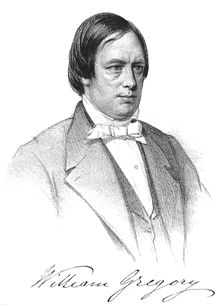William Gregory (chemist)
William Gregory (born December 25, 1803 in Edinburgh , † April 24, 1858 ibid) was a Scottish doctor and chemist . He studied with Liebig and translated some of his works. He was also interested in animal magnetism and phrenology .
Life
Gregory was born in Edinburgh in 1803 as the fourth son of physician and chemist James Gregory and Isabella MacLeod .
After medical training in Edinburgh, which he completed in 1828, he moved to Giessen and studied chemistry at the university there. In 1831 he developed a process for the production of "hydrochloric acid morphine", which was soon widely used. The mixture known today as "Gregory salt" consisted of morphine and codeine , which was obtained from opium and calcium chloride.
In 1832 he was elected a member of the Royal Society of Edinburgh and was its secretary from 1844 to 1858.
After studying in Europe for a few more years, he became an extra-academic lecturer in chemistry in Edinburgh. He was appointed professor of chemistry at Andersonian University in Glasgow, and later he was a lecturer at Dublin Medical School . In 1839 he became Professor of Medicine and Chemistry at King's College, Aberdeen . In 1844 he succeeded his old teacher Thomas Charles Hope at the University of Edinburgh. He was a successful lecturer, but increasingly suffered from an illness that severely impaired his teaching.
Gregory died on April 24, 1858 at his home on Princes Street . He left behind his wife and a son. He was buried in Canongate Kirkyard on the Royal Mile.
Works
As a student of Justus Liebig in Giessen, Gregory had translated and edited some of his works into English. His own works gave him importance in the field of organic chemistry . A list of 40 of his writings was given to the Royal Society's Catalog of Scientific Papers . He also wrote some papers on diatoms . Some of his works are:
- Outlines of Chemistry , 1845; Second edition, 1847; subsequently divided into two volumes, The Handbook of Inorganic and Organic Chemistry , 1853; the second manual was published in Germany, and Theodor Gerding edited it in Braunschweig in 1854.
- Letters to a Candid Inquirer on Animal Magnetism , 1851.
He has also published the following works, which are translations of Liebig's works: Animal Chemistry , Chemistry in its Applications to Agriculture and Physiology , Familiar Letters on Chemistry , Instructions for Chemical Analysis of Organic Bodies , Agricultural Chemistry , Chemistry of Food , and Researches on the Motion of the Juices in the Animal Body , he also published a translation of Karl Reichenbach's Researches on Magnetism, Electricity, Heat, & c., In their relation to Vital Force , 1850. Together with Liebig he translated Edward Turner's Elements of Chemistry .
literature
- Dr. Alison: Account of the Life and Labor of Dr William Gregory . In: Proceedings of the Royal Society of Edinburgh . 4, No. 49, pp. 121-122.
- Doyle, WP: William Gregory (1803-1858) . Retrieved February 22, 2016.
- MacKenzie, John E .: The Chair of Chemistry in the University of Edinburgh in the XVIIIth and XIXth Centuries . In: Journal of Chemical Education . 12, No. 11, 1035, pp. 503-511. doi : 10.1021 / ed012p503 .
- Stewart, Agnes Grainger : The Academic Gregories . Oliphant, Anderson and Ferrier , Edinburgh 1901, pp. 141-147.
Web links
- Scientific Identity: Portraits from the Dibner Library of the History of Science and Technology, 2003 . Retrieved September 27, 2008.
Individual evidence
- ^ Matthew H. Kaufman: William Gregory (1803-1858): Professor of Chemistry at the University of Edinburgh and enthusiast for phrenology and mesmerism . In: Journal of Medical Biography . 16, No. 3, England, August 2008, ISSN 0967-7720 , pp. 128-33. doi : 10.1258 / jmb.2007.007009 . PMID 18653829 .
- ↑ a b c Former Fellows of the Royal Society of Edinburgh 1783 - 2002
- ↑ a b c d e Gregory William in the Dictionary of National Biography . London: Smith, Elder & Co. 1885-1900
- ^ André Barbier, The Extraction of Opium Alkaloids (1950).
| personal data | |
|---|---|
| SURNAME | Gregory, William |
| BRIEF DESCRIPTION | Scottish doctor and chemist |
| DATE OF BIRTH | December 25, 1803 |
| PLACE OF BIRTH | Edinburgh |
| DATE OF DEATH | April 24, 1858 |
| Place of death | Edinburgh |
